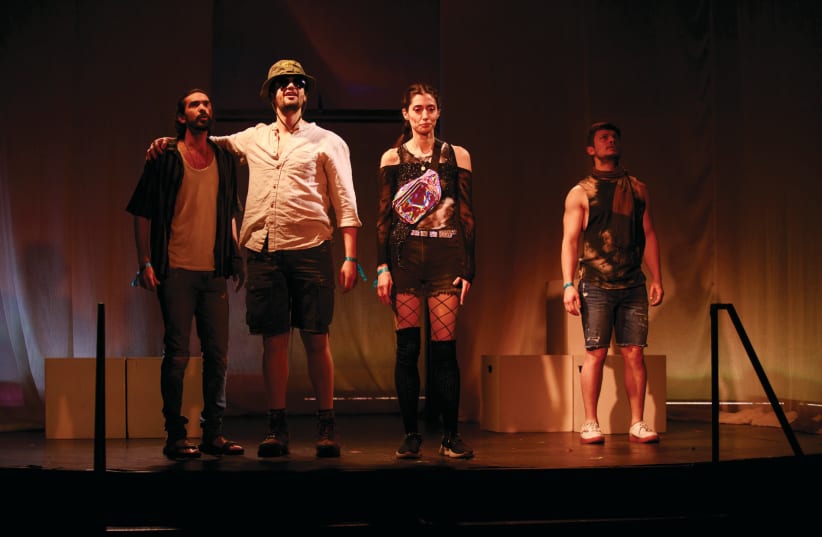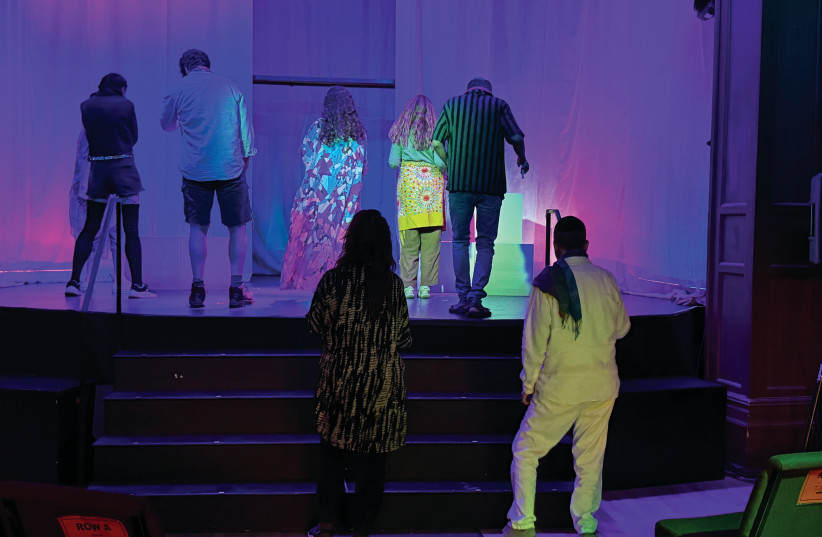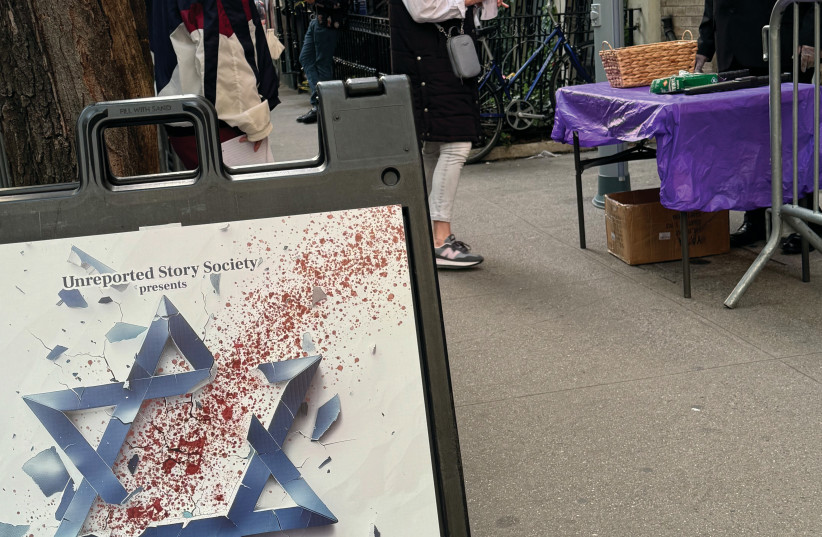If you arrive a little early at Actor’s Temple Theatre in Manhattan to see October 7 – A Verbatim Play, you may find yourself confused.
Five of the play’s 13 actors are already on stage, slowly dancing and swaying with their backs to the audience. Soon, four more actors walk through the befuddled crowd toward the stage, where they look up at their fellow actors.
Worriedly, I approach an usher who informs me, “It’s the pre-show Nova,” referring to the rave/nature party that thousands of Israelis were attending in the early morning hours of October 7 at Re’im in the South.
Survivors' stories
The play, written by Irish journalist Phelim McAleer, tells the story of October 7 through the words of people who experienced the day from up close.
The diverse group of Israelis introduce themselves at the start of the show. Tali is a Nova producer; Shani stopped in Beersheba on the way to Nova “to get ready with glitter” and prepare to teach a yoga workshop. Itamar is an Ofakim border patrol officer; Zaki, a religious man from a moshav 8 km. from the festival, delivers Coca Cola to the Nova festival. Ayelet is a Kfar Aza resident.
The audience experiences the chaotic, tumultuous, intense, and bloody day unfolding hour by hour as piercing sounds of gunfire and cries are heard. Confused concertgoers on drugs describe paragliders flying overhead.
A young girl recounts sirens at 6:30 a.m. and informs the audience how residents of the Gaza Envelope have 15 seconds to seek shelter.
Yasmin tells of terrorists in her home at 10:30 am. We also meet a policeman armed with a pistol and nine bullets who killed several Hamas members; a mother who hid for hours, wondering if her family had survived; and an off-duty IDF soldier who was shot five times by three terrorists as he fought to protect his village and others fleeing Nova while hiding under cars, in street shelters, and in trees.
Zaki and his wife describe breaking the Sabbath and Jewish holiday in order to save fellow Jews. Zaki makes numerous trips to the festival site to bring nearly 100 young people to his home for refuge.
Amid the fear and terror are moments of humor and painful irony.
“I remember a South Park episode when they were told to put their heads under the desk and their legs up – then came the volcano!” remarks one character. “I could have sold the footage to Spielberg,” another reports after his jeep flew through the air as he tried to flee Hamas terrorists.
One woman, surrounded by four Hamas terrorists, said they were so close that “they were either going to kill me or it was sexual harassment.” One parent commented that he was “pleased” that his daughter was killed and did not experience rape, unlike so many others.
The audience sees many deaths and learns about survivors’ experiences, as well as their attempts to find perspective and answers. Comments include: “They are not people. They came to kill everyone, including little children,” “October 7th was a wake-up call. We are a different country now,” and “I started keeping Shabbat.”
A female Soroka Hospital doctor reports, “I am Muslim. Evil has no religion. The division is between people who believe violence is the answer and those who believe in humanity, kindness, and peace.”
Director Geoffrey Cantor describes October 7th as “testimony.” He adds, “It is a collective sharing of traumatic memory,” and acknowledges “finding the balance between the devastation of what these people experienced and the incredible force of hope and resilience that they embody, [which] was something that we explored every day in the rehearsal room. We committed ourselves as a company to ensuring that the authentic voices of these remarkable people are heard so that the audience might be touched by their humanity and extraordinary resilience.”
Telling the untold stories
TO WRITER and producer Phelim McAleer, who reports that he “had no connection to Israel” before 10/7 and had never visited the country, it was important that the “stories get told.” McAleer, who was in Ireland on 10/7, reports that he “saw how good people were talking about how Israel was shutting off the electricity in Gaza and were calling for a ceasefire but were not talking about October 7th. They were talking as if the world started on 10/8. It was unacceptable to us that the media and elites wanted us to forget. I want the world to make up its own mind.”
McAleer and his wife, Ann McElhinney, founded The Unreported Story Society in 2017 “to tell the stories that the mainstream media ignores through art and modern media.”
“It was very important to us that this was a verbatim play,” adds McElhinney. “We gathered stories from people who lost people, survived, rescued people, or fought back against those who wanted to wipe them out.”
The play, which takes place a few minutes’ walk from Broadway, has been seen in previews in recent weeks. It officially opened on May 13 and continues through June 16.
The show’s press release cautioned that the 90-minute play “is under NYPD (New York Police Department) protection. It is the only production in New York that the NYPD is protecting, setting up barriers and stationing officers outside, amid campus protests and rising antisemitism in the city.”
During the last night of previews, there was no visible NYPD presence, although the 50 or so people in attendance had to pass through a metal detector, which is very uncommon for on- or off-Broadway shows, and four very professional guards clad in suits.
Actor Jeff Gurner, who plays Coca Cola vendor Zaki and other characters, reports, “It’s been a blessing to be part of the journey of this play – not just because I’m deeply honored to help tell these stories, but also because of the balm that is the kinship among our team.”
For Gurner, appearing in October 7 was also a way to take a stand on an issue very dear to him and to “do something” during these difficult times.
“The stories of 10/7 seem perilously close to being entirely swept under the rug amid the chaos on university campuses and all of the divisive political noise,” Gurner said. “Like so many of my Jewish friends and family, I’ve been absolutely flummoxed by how quickly we went from the horrors of that day to suddenly finding Israel branded the villain. The sheer amount of misinformation, propaganda, and outright lies that blossomed almost immediately and were inexplicably embraced here and abroad was jaw-dropping. Within my own industry, I saw how quickly and decisively the knee-jerk condemnation of Israel and absurd moral equivocation took hold, and like the Jewish students on college campuses, I felt very much alone among my colleagues – relegated to mourning privately (or at least very selectively) for fear of being maligned professionally or being forced into an endless, impossible loop of defending 10/7 to people who are being intellectually dishonest or willfully ignorant.
“Being part of this project, though, suddenly put me in a room with other artists who not only understood my feelings of isolation, but steadfastly and with full-throated passion reminded me that Never Again is Now and that I didn’t have to be silent any longer. It’s been a gift to join this cast and crew to honor those who suffered the atrocities of October 7th, and I’m grateful for the daily reminder that the stories of the heroes and innocents we are recounting in the play is all that matters. I hope our voices can help, in some small way, to drown out the dangerous and disgusting wave of antisemitism that has proliferated in the wake of their pain.”
Manhattanite Mark Chessler enjoyed the show and the acting, though he found it to be an intense experience.
“The play was really effective at pulling the audience into the events of the day in a very visceral way. The pacing made my heart race until the end, when things stopped and we were given time to process what we witnessed. It offered me (and I’m guessing other audience members) a window into the trauma being felt right now in Israeli society.”
Henry Mendelsohn, 76, a Vietnam veteran who attended the University of Haifa in the late 1960s, was looking forward to the show. However, he says, “If I were 50 years younger, I wouldn’t be sitting here talking to you – I’d be in the Israeli army!”
At the conclusion of the show, as people in the audience waited outside to greet and congratulate the actors, Mendelsohn adds, “I think they should take this show to all of the colleges!”
McAleer indicates that plans to take the show on the road to college campuses including Harvard, Cornell, and Columbia – schools that have experienced anti-Israel protests, unrest, and “Palestine” encampments in recent weeks.


